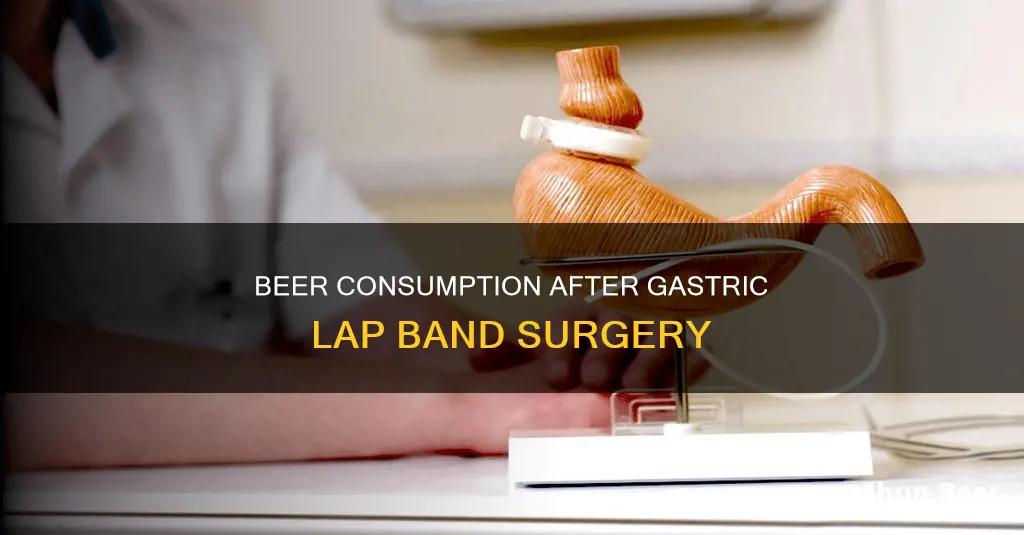
Gastric lap band surgery is a significant decision that can evoke a range of emotions, from anxiety and fear to hope and anticipation. As patients step into their post-op journey, they often wonder about the impact of alcohol on their recovery and weight loss goals. Beer, a popular alcoholic beverage, contains carbonation and calories, which may raise concerns for those who have undergone gastric lap band surgery. Understanding the effects of beer consumption after this procedure is crucial for informed decision-making and a successful recovery.
| Characteristics | Values |
|---|---|
| Can you drink beer after gastric lap band surgery? | It is not recommended to drink beer after gastric lap band surgery. Beer is carbonated and high in calories, which can hinder weight loss. |
| Alcohol consumption after gastric lap band surgery | It is recommended to avoid alcohol for at least six months after gastric lap band surgery. Alcohol can cause nausea and vomiting, and it can also lead to low blood sugar. |
| Weight loss after gastric lap band surgery | Weight loss occurs most rapidly during the first year after surgery, and alcohol consumption can slow or stunt weight loss. |
| Addiction transference | There is a risk of addiction transference, where patients replace a food addiction with an alcohol addiction after surgery. |
| Alcohol abuse disorder | There is an increased risk of developing an alcohol abuse disorder after gastric lap band surgery. |
What You'll Learn

Beer is a high-calorie drink that can slow weight loss
The high calorie content of beer can lead to excess calorie consumption, as drinking alcohol can increase appetite and cause people to eat more. Additionally, the body prioritizes the breakdown of alcohol over other sources of fuel, including stored fat, which may prevent fat burning and further contribute to weight gain. Beer is also often consumed with food, and the combination of alcohol and food can affect the body's ability to metabolize calories, leading to weight gain.
The risk of weight gain from drinking beer is higher in people who are already overweight compared to those who are at a normal weight. Additionally, men are more likely to develop a "beer belly" than women due to differences in metabolism and the tendency to store fat around the belly when gaining weight.
For individuals undergoing bariatric surgery, it is recommended to avoid drinking beer and other alcoholic beverages during the first year after surgery, as the body's ability to metabolize alcohol is greatly reduced, and drinking on an empty stomach can lead to faster intoxication. Additionally, consuming alcoholic beverages means taking in calories that are not restricted by the gastric band, which can hinder weight loss efforts.
Asking for Beer Outside Gas Stations: Does It Work?
You may want to see also

Beer is carbonated and should be avoided after gastric lap band surgery
Additionally, after gastric lap band surgery, your body will process alcohol differently. The surgery reduces the size of your stomach, and you will have less of the enzyme alcohol dehydrogenase, which breaks down alcohol. As a result, you will be exposed to higher doses of unmetabolized alcohol, leading to extra-high blood alcohol levels. This means that you will feel intoxicated more quickly and may be at a higher risk of alcohol-related health problems.
Furthermore, drinking on an empty stomach will have an even more pronounced effect after surgery. Since your stomach capacity is reduced, alcohol will enter your small intestine more quickly, leading to faster absorption into the bloodstream. This can cause you to feel the effects of alcohol after just a few sips. It is crucial to eat a meal before drinking and to be aware of your new tolerance for alcohol.
To ensure a successful recovery and maintain your health, it is best to avoid beer and other carbonated alcoholic beverages. Instead, opt for low-calorie options such as spirits mixed with calorie-free mixers or dry wines. Always consult with your doctor or dietician for personalised advice regarding alcohol consumption after gastric lap band surgery.
Beer and Colonoscopy: Drinking Timeline for the Procedure
You may want to see also

Beer contains alcohol, which is processed differently after surgery
Beer contains alcohol, which is processed differently after gastric lap band surgery. The surgery reduces the body's ability to metabolise alcohol, which can lead to intoxication after only a single drink or a few sips. This is because the stomach acts as a holding area for alcohol, slowing its release into the small bowel for absorption. After the surgery, alcohol is poured straight into the small bowel for instant absorption into the bloodstream. This means that it takes less alcohol to become intoxicated, and a person may feel and act as if they have had seven glasses of wine when they have only had two.
The effects of alcohol are much stronger when consumed on an empty stomach. After bariatric surgery, patients are on a restricted-calorie diet and cannot eat the same quantities of food. This means that they will be affected by alcohol faster and more strongly. This can lead to accidental overconsumption, with some patients reporting that they got a DUI after having just one beer with dinner.
Beer and other carbonated alcoholic drinks should be avoided after gastric lap band surgery, as they can cause nausea and vomiting. The narrow outlet created by the band means that high-calorie liquids like beer will simply run through and may result in weight gain. It is recommended that patients avoid alcohol for at least six months following the procedure. When drinking alcohol again, it is important to avoid sugary and carbonated beverages and to consume alcohol slowly with a meal.
There is also a risk of developing an alcohol use disorder after bariatric surgery. Evidence suggests that the likelihood of this increases. This may be due to the fact that the surgery changes how the body metabolises alcohol, or it could be related to underlying problems that were previously addressed with food.
Beer and Tequila: Mixing Alcohol Safely
You may want to see also

Beer drinking can lead to low blood sugar
Drinking beer after bariatric surgery is not recommended. Bariatric surgery drastically changes how your body handles alcohol, and you can get intoxicated after only a single drink or a few sips. Beer is also carbonated and should be avoided, just like soda and carbonated water, which are not allowed as part of your new dietary plan.
Beer drinking can affect your blood sugar levels, especially if you have diabetes. When you drink beer, your body prioritises detoxifying itself from the alcohol, which puts other metabolic functions on hold, including burning body fat for fuel and metabolising the food you've eaten into energy. This means that the food you eat while drinking beer is more likely to be stored as fat while your body eliminates the alcohol. The alcohol in beer can also interfere with your body's ability to produce blood cells in the bone marrow, leading to a reduction in the number of platelets in the blood. Platelets are the blood cells that rush to an injury site to form a clot and stop bleeding. Drinking beer can reduce the number of these cells and make the remaining platelets less sticky, affecting their ability to clump together and form a plug to close a wound. This blood-thinning effect of beer can increase your risk of a bleeding stroke, especially if consumed in large quantities. For men, this means more than two drinks a day, and for women, this means more than one drink a day.
Drinking beer can also affect your blood sugar levels by impacting your pancreas, which is responsible for releasing hormones that regulate blood sugar. Alcohol can cause the pancreas to produce more insulin, leading to a drop in blood sugar levels. Additionally, beer contains carbohydrates that can be broken down into sugar by the body, further influencing blood sugar levels.
Beer drinking can also affect the absorption of certain vitamins and minerals, which are essential for maintaining healthy blood sugar levels. For example, alcohol can interfere with the absorption of vitamin B, which is crucial for converting glucose into energy.
Finally, beer drinking can contribute to weight gain, which can increase your risk of developing type 2 diabetes. Type 2 diabetes is a condition where the body becomes resistant to insulin, leading to high blood sugar levels. Beer is typically high in calories and carbohydrates, which can lead to weight gain if consumed in excess.
Beer, Constipation, and You: The Surprising Truth
You may want to see also

Beer drinking can increase the risk of alcohol abuse
Secondly, beer drinking can increase the risk of alcohol abuse due to its effects on the body and brain. Beer contains alcohol, which interferes with the brain's communication pathways and can affect mood, behaviour, and coordination. Heavy drinking can also damage the heart, leading to cardiomyopathy, arrhythmias, and high blood pressure. Additionally, it can cause liver problems such as steatosis or fatty liver and increase the risk of pancreatitis.
Thirdly, beer drinking is associated with an increased risk of certain types of cancer, including head and neck cancer, oesophageal cancer, and breast cancer. Even moderate alcohol consumption can increase the risk of these cancers.
Finally, beer drinking can weaken the immune system, making the body more susceptible to diseases like pneumonia and tuberculosis. It can also slow down the body's ability to fight infections, even up to 24 hours after drinking. Therefore, it is important to drink beer in moderation and be aware of the potential risks associated with excessive consumption.
Mixing Beer and Nyquil: Safe or Risky?
You may want to see also
Frequently asked questions
Beer is a carbonated drink and should be avoided after gastric band surgery. It is recommended that you avoid alcohol for at least six months following your procedure.
Alcohol abuse is one of the most common forms of addiction to develop in people after weight loss surgery. Drinking after surgery can also lead to low blood sugar and higher blood alcohol levels, which may put you at a higher risk of alcohol use disorder.
Spirits mixed with zero-calorie/low-calorie mixers and dry wines are better alternatives as they are lower in calories.
Always have someone you trust around if you choose to drink. Plan how many drinks you will have and space them out. Eat a meal before you drink and never drink on an empty stomach.







